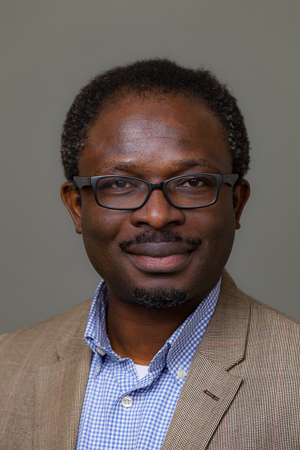Professor Spotlight: Jacob Jacob
Visiting International Scholar Professor Jacob Jacob began his “academic journey” as an undergraduate in his homeland of Nigeria at the University of Uyo. After graduating with a degree in Communication Arts, Jacob travelled to England to study for his Masters at Lancaster University and then his doctorate at University of Leeds in West Yorkshire.
“I’ve always, I think, admired the British education,” said Jacob. “I always wanted to have that British education, so when I had the funding, the scholarship, to go, I took it with both hands.”
In England, Jacob found himself “particularly interested” in a specific Master’s program at Lancaster University: Peace Studies. “It’s a brilliant program,” said Jacob, “really problematizing peace. You have…the War College, but then you also have the Peace College, where peace is treated as a problematic, if you like, researched actively.”
“After Lancaster,” said Jacob, “I was particularly interested in how the tools of communications can be used to build peace.”
Jacob’s interest in peace and social activism did not begin after his time at Lancaster. Social activism and social justice issues have always been an interest of his. During his undergraduate experience, Jacob founded and led a school radio. He recalled “work[ing] with engineering students” until they “build a transmitter that was good enough” before beginning to broadcast. His broadcasts, however, landed Jacob in a tight spot under Nigeria’s military rule. He began the story saying, “I’ve been arrested before…and that was one of those times.”
“[The radio] interviewed one of the [Model United Nations] officials who said all kinds of crazy things about the [Nigerian] government…I wasn’t the one who did that interview, it was another guy who did that interview, but…the following morning there was a knock on my door and I was picked up.” Jacob related how he was helped by his fellow students. “The good thing,” he said, “was that after they picked me up, students really came out protesting and all that, and I was released after a day.”
“With the military, it’s terrifying,” said Jacob of his arrest. “But then, you’re young, [if it happened] now, I’d probably be really scared, but then, I wasn’t.”
Though Jacob described himself as “rather boring,” he has many diverse experiences to share, which he does in his classes at Dickinson: Social Movements, Media and Global Change during the fall semester of 2017 and The Media in War and Peace in the spring semester of 2018.
“I felt that in order to study social movements, we should all have the opportunity of doing social movements,” said Jacob of his Social Movements, Media and Global Change class. Professor Jacob reasons that students should be involved in social activism and movements because “naiveté can be a good thing… ‘adults’ out there, in quotation marks, are too experienced to believe in change” and Jacob says that the belief in change is an integral aspect of any movement that is able to create change.



